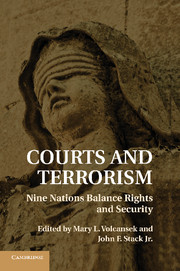Book contents
- Frontmatter
- Contents
- Contributors
- COURTS AND TERRORISM
- Introduction
- 1 Detentions and Security versus Liberty in Times of National Emergency
- 2 One More Casualty of the “War on Terror”
- 3 State Secrets and Democratic Values
- 4 What Lessons Can Be Drawn from a Sui Generis Case? The Global “War on Terror” and Northern Ireland
- 5 The British Experience with Terrorism: From the IRA to Al Qaeda
- 6 Detention and Treatment of Suspected Terrorists under the European Convention on Human Rights
- 7 Australia's Commonwealth Model and Terrorism
- 8 Judicial Rejection as Substantial Relief: The Israeli Supreme Court and the “War on Terror”
- 9 Preserving Rights and Protecting the Public: The Italian Experience
- 10 Squaring the Circle? Fighting Terror while Consolidating Democracy in Spain
- 11 From Exception to Normalcy: Law, the Judiciary, Civil Rights, and Terrorism in Colombia, 1984–2004
- Conclusion: Lessons Learned
- Cases Cited
- Statutes Cited
- References
- Index
11 - From Exception to Normalcy: Law, the Judiciary, Civil Rights, and Terrorism in Colombia, 1984–2004
Published online by Cambridge University Press: 05 July 2011
- Frontmatter
- Contents
- Contributors
- COURTS AND TERRORISM
- Introduction
- 1 Detentions and Security versus Liberty in Times of National Emergency
- 2 One More Casualty of the “War on Terror”
- 3 State Secrets and Democratic Values
- 4 What Lessons Can Be Drawn from a Sui Generis Case? The Global “War on Terror” and Northern Ireland
- 5 The British Experience with Terrorism: From the IRA to Al Qaeda
- 6 Detention and Treatment of Suspected Terrorists under the European Convention on Human Rights
- 7 Australia's Commonwealth Model and Terrorism
- 8 Judicial Rejection as Substantial Relief: The Israeli Supreme Court and the “War on Terror”
- 9 Preserving Rights and Protecting the Public: The Italian Experience
- 10 Squaring the Circle? Fighting Terror while Consolidating Democracy in Spain
- 11 From Exception to Normalcy: Law, the Judiciary, Civil Rights, and Terrorism in Colombia, 1984–2004
- Conclusion: Lessons Learned
- Cases Cited
- Statutes Cited
- References
- Index
Summary
Judicial responses to conduct defined in Colombia's internal legislation as terrorism include responses to “related crimes,” for in Colombia, terrorism has been treated together with other criminal activities such as kidnapping, extortion, bearing and trading illegal weapons or explosives, and even narcotics-related offenses. This chapter covers approximately two decades – from 1984, when a major law establishing a “specialized” jurisdiction to prosecute terrorism was enacted, until 2004, when a major Constitutional Court decision declared invalid an amendment to the Constitution that, to counter “terrorism,” had provided for the possibility that a law could regulate the interception of private communications, detention, and searches and seizures without the need for a judicial order. In 2004, the new criminal accusatory system (Law 95, 2004) was passed, which suggests that the narrative should conclude at that juncture. In addition to describing the legal context of the judicial decisions, this chapter summarizes each of the various responses and examines the extent to which the formally democratic regime could ultimately apply sufficient restraints, checks, and balances to protect constitutional rights and due process. The chapter also evaluates the general meaning, durability, and overall impact of judicial measures in the fight against terrorism.
The judicial responses identified and discussed are of two types. One is a series of judicial review rulings by the Supreme Court (before 1991) and the Constitutional Court (after 1991) that addressed the legality of terrorism-related legislation issued during times of emergency.
- Type
- Chapter
- Information
- Courts and TerrorismNine Nations Balance Rights and Security, pp. 199 - 223Publisher: Cambridge University PressPrint publication year: 2010



